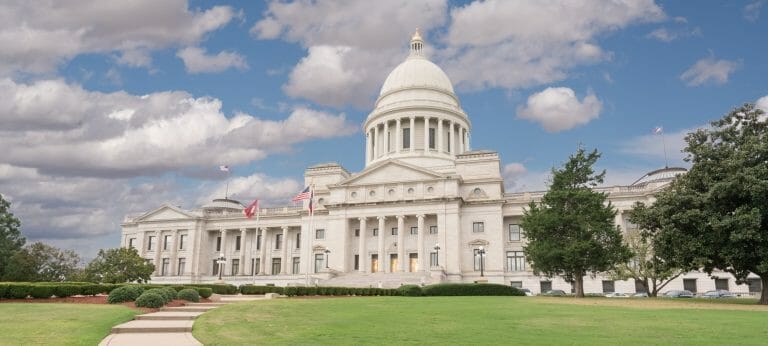
Categories

For a downloadable version of this tax update, click here.
The 94th General Assembly 2023 Regular Session convened January 9, 2023 and adjourned sine die on May 1, 2023. Three (3) special sessions were called by the Governor between the end of the 2021 regular session and the beginning of the 2023 regular session, two of which provided significant income tax rate cuts and other material tax changes summarized below.
Arkansas’ 2023 regular session saw the enactment of nearly 60 tax-related bills. Highlights from the session include:
- Phasing out the corporate income tax throwback apportionment rule (Act 485);
- Further reducing income tax rates applicable to individuals, trusts, and estates to 4.7%, and for corporations to 5.1% (Act 532);
- Extending the sales and use tax exemption for partial replacement and repair parts used directly in manufacturing to include parts placed in inventory (Act 646).
I. INCOME/FRANCHISE TAXES
2021 AND 2022 SPECIAL SESSIONS
Individual rate cuts to 4.9%: Companion Acts 1 and 2 of the 2nd Extraordinary Session (2021) provided for a gradual top bracket rate reduction for individuals from 5.9% to 4.9% over a 4-year period, beginning in 2022.
Companion Acts 1 and 2 of the 3rd Extraordinary Session (2022) accelerated the rate reduction and made the entire 1% rate cut from 5.9% to 4.9% effective January 1, 2022.
Fine tuning provisions of the initial Acts that were not affected included bracket harmonization yielding further relief for the middle class, cliff adjustments, a low-income tax credit and standard deduction indexing. An additional one-time inflationary relief tax credit for low and middle-income taxpayers was added for 2022 in the subsequent Acts. The lower individual rates will also apply for purposes the new passthrough entity tax.
Corporate rate cuts to 5.3%: The top rate for corporations was already scheduled to drop from 6.2% to 5.9% in 2022. Once again, companion Acts 1 and 2 of the 2nd Extraordinary Session (2021) provided for further reductions from 5.9% to 5.3% over a three (3) year period.
Companion Acts 1 and 2 of the 3rd Extraordinary Session (2022) made the entire 0.6% reduction to 5.3% effective for years beginning on or after January 1, 2023.
Section 179 Expense Election: Companion Acts 1 and 2 of the 3rd Extraordinary Session also adopt federal Section 179 expensing provisions as in effect January 1, 2022.
Arkansas previously adopted Section 179 as in effect on January 1, 2009, with a dollar limitation on deduction of $25,000 and a dollar-for-dollar phase-out starting at $200,000, adjusted for inflation each year.
The 2022 version of the federal Section 179 expense election allows businesses to deduct the entire purchase price of new or used equipment up to $1.08 million in 2022, rather than capitalizing and depreciating the asset over the designated useful life of the asset. The $1.08 million deduction is reduced dollar-for-dollar if asset purchases exceed $2.7 million for 2022.
2023 REGULAR SESSION
Act 96: Prohibits local governments from enacting an income tax by repealing Ark. Code Ann. §§ 14-43-607 and 26-73-104. Effective July 31, 2023.
Act 191: Amends the $500 income tax credit for support of a child with a developmental disability to remove the requirement for recertification of a developmental disability that is expected to continue indefinitely. Effective retroactive to January 1, 2022.
Act 358: Allows a taxpayer with military connections claiming an income tax exemption of less than six thousand dollars ($6,000) for income from military retirement or survivor benefits to also claim as exempt additional retirement benefits from an individual retirement account or from public or private employment-related retirement systems not to exceed six thousand dollars ($6,000) cumulative. Effective retroactive to January 1, 2023.
Act 439: Provides that income earned by esports tournament competitors or organizers is subject to state income tax. “Esports” means any form of multiplayer competition in which competitors compete against each other using video gaming consoles, computers, or other electronic devices. Paid esports tournaments do not constitute gambling and are exempt from gaming or gambling statutes. Effective July 31, 2023.
Act 485: Phases out the corporate income tax throwback apportionment rule over six (6) years. Following the transition period for tax years beginning on or after January 1, 2030, sales shipped outside of Arkansas shall be sourced one hundred percent (100%) outside the state. Effective January 1, 2024.
Act 532: Reduces income tax rates applicable to individuals, trusts, and estates from 4.9% to 4.7%, updates bracket adjustment deductions for cost-of-living, and reduces income tax rates applicable to corporations from 5.3% to 5.1% on net income exceeding twenty-five thousand dollars ($25,000). Effective retroactive to January 1, 2023.
Act 625: Extends the definition of “claimant agency” for purposes of the setoff against state tax refunds to include the Contractors Licensing Board, the Residential Contractors Committee, and the Department of Labor and Licensing as claimant agencies that may offset a taxpayer’s state income tax refund to satisfy a debt. Effective July 31, 2023.
Act 644: Reduces the number of employees required for the electronic filing of annual income tax withholding statements from 250 to 125 employees; however, the Secretary of the Arkansas Department may waive the electronic filing requirement upon a showing of undue hardship by the employer. Effective January 1, 2024.
Act 715: Requires a limited liability partnership, foreign limited liability partnership, limited partnership, and foreign limited partnership to file an annual report by August 1 of each year (previously, between January 1 and April 1 and May 1 of each year) following the calendar year in which a partnership files a statement of qualification or a foreign partnership becomes authorized to transact business in Arkansas. Effective July 31, 2023.
II. TRANSACTION TAXES (SALES/USE TAXES)
Act 130: Amends various statutes providing for consistent treatment of the additional one-half percent (½%) sales and use tax imposed for highway funding pursuant to Arkansas Constitution Amendment 101, which was approved by voters in 2020, to replace the temporary one-half percent (½%) sales and use tax imposed for highway funding pursuant to Arkansas Constitution Amendment 91. The levy of tax imposed by Amendment 101 commences when the tax imposed by Amendment 91 sunsets upon retirement of all outstanding bonds. Effective February 24, 2023.
Act 192: Requires taxpayers that incur an average monthly sales or use tax liability of five thousand dollars ($5,000) or more for the preceding fiscal year that began on July 1 and ended on June 30 shall file all returns and remittances electronically. Effective January 1, 2024.
Act 193: Amends prepayment calculation requirements for retailers that, on July 1, have average net sales of more than two hundred thousand dollars ($200,000) per month and pay sales tax by electronic funds transfer by changing the calculation date range from the preceding calendar year to the preceding fiscal year. Effective July 1, 2023.
Act 278: Provides that revenues collected under contracts for obtaining electric energy from a net-metering facility under a service contract with a government entity or other entity that is exempt from state and federal income tax and qualifying for safe-harbor protection as provided under 26 U.S.C. § 7701(e)(3)(A), as in effect on August 16, 2022, are exempt from state and local sales taxes. Effective March 13, 2023.
Act 351: Amends the definition of “manufacturing” and “processing” for purposes of the compensating use tax exemption for machinery and equipment used directly in manufacturing to include retreading of tires for automobiles, trucks, and other mobile equipment powered by electrical or internal combustion engines or motors. Effective September 1, 2023.
Act 446: Expands the sales tax exemption for sales at concession stands operated by a nonprofit youth athletic organization to also exempt sales at concession stands operated by other types of nonprofit youth organizations. Effective October 1, 2023.
Act 518: Provides an exemption from sales tax for sales of tangible personal property, specified digital products, a digital code, or a service to the Disabled American Veterans Organization. Effective September 1, 2023.
Act 521: Provides an exclusion from levying sales tax on membership dues paid to a hunting or fishing club that are paid to obtain access to land for the primary purpose of hunting or fishing. Effective September 1, 2023.
Act 534: Provides a sales and use tax exemption for the sale of a new or used mortality composting device to a person engaged in the commercial production of livestock or poultry. Effective October 1, 2023.
Act 646: Extends the sales and use tax exemption applicable to partial replacement and repair parts for machinery and equipment used directly in manufacturing to include parts purchased and placed in inventory for later use by the taxpayer, subject to taxation upon withdrawal from inventory if used for a non-exempt purpose. Effective September 1, 2023.
Act 658: Allows a railroad to choose between two different methods to apportion its income for corporation income tax purposes. An organization operating a railroad partly within Arkansas and partly outside the state may apportion the net operating income attributable to Arkansas by multiplying the organization’s income by either a sales factor apportionment or a three-factor apportionment, which includes property, payroll, and double-weighted sales. Effective retroactive to January 2, 2023.
Act 819: Provides a discretionary sales and use tax exemption for sales to a qualified data center for data center equipment (computer equipment/software including labor services to install, repair, alter, or maintain); eligible data center costs (land, buildings, equipment, leases, engineering, and design); services for developing, acquiring, constructing, expanding, renovating, refurbishing, and operating a qualified data center; and electricity used by a qualified data center. A qualified data center means a facility operated to house a group of networked computer servers to centralize the storage, management, and dissemination of data and information pertaining to a particular business or classification or body of knowledge; invests fifty million dollars ($50,000,000) over five (5) years; pays an aggregate annualized compensation of at least one million dollars ($1,000,000) to employees within the state over the two (2) calendar years; and has received a positive cost-benefit analysis from the Arkansas Economic Development Commission. Effective October 1, 2023.
Act 827:Provides a sales and use tax exemption for sales of a service providing for the electronic transmission of a drug prescription directly to a pharmacy including services provided directly by an electronic prescription technology company or indirectly through a pharmacy software company or pharmacy management system. Effective October 1, 2023.
III. PROPERTY TAXES
Act 139: Changes county reappraisal cycles from either three (3) or five (5) years based on relative county-wide valuation increases to a standard four (4) year reappraisal cycle, with transition provisions to equalize the number of counties reappraised each year. Effective July 31, 2023.
Act 315: Increases the amount of the homestead property tax credit from three hundred seventy-five dollars ($375) to four hundred twenty-five dollars ($425). Effective retroactive to January 1, 2023.
Act 332: Clarifies that intangible personal property of self-service storage facilities is exempt from all ad valorem tax levies including goodwill, rental agreements, customer lists, security systems, future development opportunities, and management software, and requires a county assessor to provide upon request written explanation of the value of a taxpayer’s intangible personal property. Appears much like a “dark-store” valuation approach contrary to prevailing commercial appraisal practices. Effective retroactive to January 1, 2023.
Act 365: Eliminates references to the Arkansas Public Service Commission as the State Equalization Board while preserving its authority to “equalize” county valuations. Effective July 1, 2023.
Act 395: Expands the definition of “homestead” for purposes of the property tax exemption for disabled veterans, surviving spouses of disabled veterans, and minor dependent children of disabled veterans to include a dwelling occupied as his or her principal place of residence and up to forty (40) acres of real property contiguous to such dwelling if the contiguous property is not being used for a commercial purpose. Effective retroactive to January 1, 2023.
Act 541: Expands the definition of homestead for purposes of the homestead property-tax exemption to include a dwelling owned by a limited liability company whose members are either a married couple or otherwise no more than one (1) natural person, at least one (1) of whom claims the homestead tax credit and uses the dwelling as his or her principle place of residence. Effective January 1, 2024.
IV. MISCELLANEOUS TAXES
Act 34: Removes the requirement for cities to collect A&P tax in order to create designated entertainment districts to sell alcoholic beverages. Effective July 31, 2023.
Act 39: Eliminates obsolete mapping requirements and resulting population changes that the Arkansas Fire and Police Pension Review Board must consider for disbursement of premium tax revenues to a city, town, or fire protection district for the purpose of funding local police and fire relief and pension funds. Effective July 31, 2023.
Act 124: Repeals a restriction that prevented the University of Arkansas at Fort Smith from expending state funds or funds derived from property taxes to support an intercollegiate football program, and repeals the exemption from all state, county, and municipal taxes levied against principal and interest on revenue bonds issued by the University of Arkansas from the State Legal Education Fund for constructing and operating in state schools of law. Effective July 31, 2023.
Act 190: Requires voter approval of a city or county governing body enacting an ordinance levying or increasing A&P sales tax at a special election at least seventy-five (75) days prior to the date tax is enacted. Effective March 6, 2023.
Act 459: Modifies the Corporate Franchise Tax Act of 1979, amends the definition of “corporation” to include “limited liability companies,” requires the collection of a processing fee for documents delivered by electronic means, establishes the Secretary of State Business and Commercial Services Electronic Filing System Fund which shall be used by the Secretary of State to pay for the maintenance and support of the business and commercial services electronic filing system, removes individuals who serve as an incorporator or organizer of a corporation or limited liability company from liability related to past-due franchise taxes, and requires each corporation to file with its original articles of incorporation or certificate of organization the name of at least one (1) individual who is substantially connected to the corporation and is responsible for payment of franchise taxes. Effective July 31, 2023.
Act 641: Extends the sunset date for the four percent (4%) special privilege tax under the Arkansas Medical Marijuana Special Privilege Tax Act of 2017 from July 1, 2023, to July 1, 2025. Effective April 11, 2023.
Act 713: Provides that existing tire rim removal fee, tire import fee, and commercial generator fees are now subject to, in addition to the Arkansas Tax Procedure Act, the business closure procedures under Ark. Code Ann. §26-18-1001, et seq. Furthermore, for the state used tire program, the existing tire districts are repealed and four used tire programs are created and governed by a tire accountability board in each program. Effective April 11, 2023.
V. TAX CREDITS AND INCENTIVES
Act 237: As part of the Governor’s education package under the Learns Act, expands the maximum amount of state income tax credits awarded under the Philanthropic Investment in Arkansas Kids Program Act from two million dollars ($2,000,0000) to six million dollars ($6,000,000) per calendar year, including five percent (5%) increases for each subsequent year if certain conditions are satisfied, which are available to taxpayers that contribute to a scholarship granting organization offering scholarships to qualified students at private schools. Effective March 8, 2023.
Act 365: Repeals income tax credits for qualified art projects under the Arkansas Delta Music Trail Act and designates the Division of Arkansas Heritage and the Department of Parks, Heritage, and Tourism to administer the program and provide tax incentives to eligible persons for the creation and installation of eligible art projects. Effective July 1, 2023.
Act 517: Increases the tax incentive from twenty percent (20%) to twenty-five percent (25%) on all qualified production costs in connection with the production of a state-certified film project, provides an addition tax incentive of five percent (5%) for hiring employees or paying businesses for production costs that are located in Tier 3 or Tier 4 Counties in Arkansas, and provides an additional tax incentive of five percent (5%) for producing a multi-project production, including a television series and a multi-film project. Effective July 31, 2023.
Act 524: Applies to agreements for payments in lieu of ad valorem (property) taxes (PILOTs) permitted to achieve up to 65% tax abatements for properties transferred to governmental units and leased back in connection with issuing industrial development revenue bonds. For agreements entered into after September 1, 2023, requires the lessee/purchaser to provide a copy of the PILOT agreement to the county assessor, including a description of the real and personal property that is subject to the PILOT agreement, except information that, if disclosed, would give an advantage to competitors. Also standardizes billing and collection procedures. Effective July 31, 2023.
Act 624: Amends the definition of a “qualified steel specialty products manufacturing facility” under the waste reduction, reuse, or recycling equipment credit to allow a facility with a closing date before October 1, 2023, (previously, July 1, 2023) to qualify for the credit. Effective retroactive to January 1, 2023.
Act 650: Beginning fiscal year 2024, increases the percentage amount of historic rehabilitation income tax credits to total qualified expenses incurred by an owner of certified rehabilitation from twenty five percent (25%) to up to forty percent (40%) in a city with a population of less than ten thousand (10,000), up to thirty five percent (35%) in a city with a population of at least ten thousand (10,000) and not more than fifty thousand (50,000), and up to thirty percent (30%) in a city with a population of less than ten thousand (10,000). Effective July 31, 2023.
Act 651: Extends the application period for the Arkansas major historic rehabilitation tax program credit from June 30, 2025, to 2030. Effective July 31, 2023.
Act 652: Establishes the Natural State Initiative Pilot Program to promote outdoor recreation and industry, recruit new business, and designate Natural State Initiative Opportunity Zones under the Arkansas Tourism Development Act; amends the definition of “eligible company” to include an entity that invests in a tourism attraction project in a Natural State Initiative Opportunity Zone, a minimum of $250,000 in a high-unemployment county, or $500,000 in any other county; amends the definition of “tourism attraction” to include restaurants and lodging facilities located within a Natural State Initiative Opportunity Zone and facilities owned by the State of Arkansas or a political subdivision of the state if the facility is leased by an eligible company and is located within a Natural State Initiative Opportunity Zone. Effective July 31, 2023.
Act 691: As part of consolidating state agriculture boards and commissions, amends provisions under the Arkansas Private Wetland and Riparian Zone Creation, Restoration, and Conservation Tax Credits Act directing a taxpayer wishing to obtain a wetland and riparian zone creation and restoration tax credit to submit an application to the Arkansas Department of Agriculture (previously, the Arkansas Natural Resources Commission). Effective July 1, 2023.
Act 834: Expands the types of businesses eligible for (i) the Consolidated Incentive Act of 2003, which is the State’s main authorizing legislation for incentive programs for job creation and capital investment, and (ii) a discretionary grant of up to two hundred fifty thousand dollars ($250,000) under the Business and Technology Accelerator Act, to include businesses primarily engaged in operating combustors and incinerators for the disposal of nonhazardous solid waste, as classified in code 562213 of the 2022 North American Industry Classification System.
Act 845: Expands the Wood Energy Products and Forest Maintenance Income Tax Credit program to include a qualified wood energy products and forest maintenance expansion project that commences construction on or before January 1, 2023, uses low value wood products, incurs a total investment in excess of fifty million dollars ($50,000,000), creates one hundred (100) net new jobs earning at least sixty thousand dollars ($60,000) each annually, provides a positive cost benefit to the state, and certifies certain construction milestones by December 31, 2025. Effective retroactive to January 1, 2023.
Act 881: Creates a waterways investment tax credit program providing an income tax credit up to three million dollars ($3,000,000) per taxpayer for the cost of making capital improvements to a facility or property related to using water transportation in the state, including construction, improvement, capital facility rehabilitation, and expansion of a waterway facility and the construction or improvement of rail or road access to a waterway facility. Credits are capped annually at two million five hundred thousand ($2,500,000) cumulative, are subject to the discretion of the Secretary of the Department of Commerce and may be applied each year up to ten percent (10%) of the total tax credit earned. Any unused credits may be carried forward for nine (9) years. The program sunsets December 31, 2025. Effective January 1, 2024.
VI. PROCEDURAL AND GENERAL ADMINISTRATION
Act 12: Separates the offices of sheriff and tax collector in Hempstead County. At the 2026 general election, the electors of the county will elect both a sheriff and a tax collector-treasurer, and each elected officer will take office on January 1, 2027. Effective January 1, 2024.
Act 172: Amends management and sale of tax delinquent lands by the commissioner of state lands and allows the commissioner to return incorrectly certified tax-delinquent parcels to the county, standardizes the use of the term “parcel,” repeals obsolete provisions regarding escrow funds held from excess sale proceeds, requires undistributed funds held in escrow for two (2) years to escheat to the county in which the parcel is located, and repeals the reassessment requirement for depreciated tax-delinquent lands. Effective July 31, 2023.
Act 173: Allows a redemption deed or sale deed to be canceled and a penalty imposed if the payment instrument used to redeem or purchase tax-delinquent property fails or is dishonored. Effective July 31, 2023.
Act 181: Provides technical corrections to obsolete provisions of Title 26 concerning taxation. Effective July 31, 2023.
Act 204: Repeals the expired and obsolete Arkansas Alternative Energy Commission formed in 2009 to study the feasibility of creating or expanding alternative energy sources in Arkansas. Effective July 31, 2023.
Act 241: Amends procedures concerning the sale and redemption of tax-delinquent property and requires the Commissioner of State Lands to notify owners and interested parties by regular mail at least thirty (30) days before an auction or by certified mail when the first bid is received for a sale online, changes the redemption deadline from ten (10) days following a sale to 4:00 p.m. CST on the last business day before the date of the sale, and allows redemption payments made by certified funds, cash, credit card, debit card, electronic/escrow check, money order, cashier’s check, or certified bank check. Effective March 9, 2023.
Act 251: Specifically adopts the “mailbox rule” for filings with the Tax Appeals Commission. Clarifies that the effective date of a filing by mail for any return, claim, statement, or other document filed with the Tax Appeals Commission is deemed to be the date of the United States postmark. Effective March 9, 2023.
Act 338: Requires charitable organizations with contributions in excess of one million dollars ($1,000,000) during the preceding fiscal year to file an audited financial statement rather than tax returns and schedules to the Secretary of State for annual financial reporting purposes. Effective July 31, 2023.
Act 346: Relaxes appointment procedures for the new Tax Appeals Commission to provide for an option of filling of vacancies on the Commission with candidates who are not nominated but who meet the applicable licensure requirements of a particular pool and who otherwise meet the statutory qualification requirements and provides that the Governor may designate any one Commissioner as Chief Commissioner and change such designation at any time. Effective March 21, 2023.
Act 447: Separates the offices of sheriff and tax collector and consolidates into one office the offices of tax collector and treasurer in Ouachita County. At the 2026 general election, the electors of the county will elect both a sheriff and a tax collector-treasurer, and each elected officer will take office on January 1, 2027. Effective July 31, 2023.
About the Wright Lindsey Jennings SALT Team
Eli Bauer’s practice emphasizes taxation, business law and regulatory issues. He received his B.S. degree from Arkansas State University, and his J.D. degree, with honors, from the University of Arkansas School of Law at Fayetteville. Mr. Bauer is a member of the Section on Taxation of the Arkansas Bar Association and is a co-author of the Arkansas chapter of the American Bar Association’s Sales and Use Tax Deskbook.
Thane J. Lawhon’s practice emphasizes taxation, business law and regulatory issues. He received his B.S. degree from the University of Arkansas at Fayetteville, his M.B.A. degree from the University of Arkansas at Little Rock, and his J.D. degree, with honors, from the William H. Bowen School of Law. Mr. Lawhon is a member of the American, Arkansas and Pulaski County Bar Associations. He is co-author of the Arkansas chapter of the American Bar Association’s Sales and Use Tax Deskbook, co-presenter for the Arkansas Sales Tax School, and is a frequent contributor to articles, updates, and materials about state and local tax issues.
Michael O. Parker’s practice emphasizes taxation, business law and regulatory issues. He received his B.A. degree from Vanderbilt University and his J.D. degree, with honors, from the University of Arkansas School of Law at Fayetteville. Organizational activities include service as special tax counsel and legislative representative on tax issues for the Arkansas State Chamber of Commerce and Associated Industries of Arkansas. Mr. Parker is a past chair of the Section on Taxation of the Arkansas Bar Association and has been a co-author of the Arkansas chapter of the American Bar Association’s Sales and Use Tax Deskbook for over 30 years.









































































